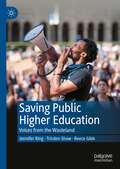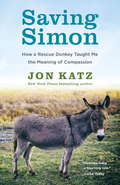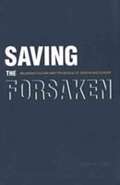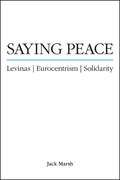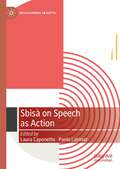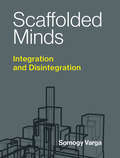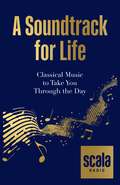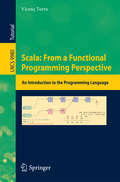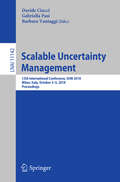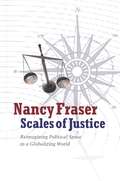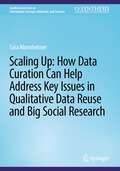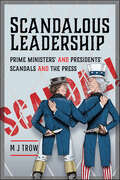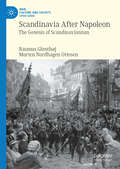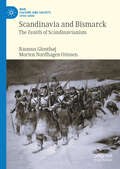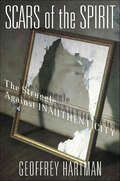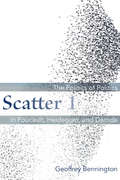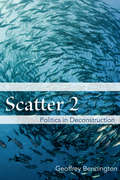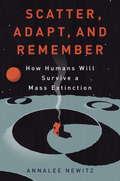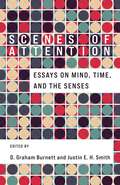- Table View
- List View
Saving Persuasion: A Defense of Rhetoric and Judgment
by Bryan GarstenIn today's increasingly polarized political landscape it seems that fewer and fewer citizens hold out hope of persuading one another. Even among those who have not given up on persuasion, few will admit to practicing the art of persuasion known as rhetoric. To describe political speech as "rhetoric" today is to accuse it of being superficial or manipulative. In Saving Persuasion, Bryan Garsten uncovers the early modern origins of this suspicious attitude toward rhetoric and seeks to loosen its grip on contemporary political theory. Revealing how deeply concerns about rhetorical speech shaped both ancient and modern political thought, he argues that the artful practice of persuasion ought to be viewed as a crucial part of democratic politics. He provocatively suggests that the aspects of rhetoric that seem most dangerous--the appeals to emotion, religious values, and the concrete commitments and identities of particular communities--are also those which can draw out citizens' capacity for good judgment. Against theorists who advocate a rationalized ideal of deliberation aimed at consensus, Garsten argues that a controversial politics of partiality and passion can produce a more engaged and more deliberative kind of democratic discourse.
Saving Public Higher Education: Voices from the Wasteland
by Jennifer Ring Trisden Shaw Reece GibbIn this book, eleven recent college graduates describe in vivid detail their journeys from racially segregated, underfunded public schools to a state university, and the obstacles they encountered along the way. Chapters highlight personal accounts of poverty, violence, and bullying in childhood, the persistence of racism on the university campus and the inability of faculty and administrators to combat it. Overcoming all-too-common barriers, these eleven students persevered, earned their degrees and continued on to graduate school and professional careers. The authors conclude the book with policy proposals that not only address the issues raised by the students, but that would also restore public education to its original role as an engine of opportunity and driver of democracy.
Saving Simon
by Jon KatzIn this heartfelt, thoughtful, and inspiring memoir, New York Times bestselling author Jon Katz tells the story of his beloved rescue donkey, Simon, and the wondrous ways that animals make us wiser and kinder people. In the spring of 2011, Jon Katz received a phone call that would challenge every idea he ever had about mercy and compassion. An animal control officer had found a neglected donkey on a farm in upstate New York, and she hoped that Jon and his wife, Maria, would be willing to adopt him. Jon wasn't planning to add another animal to his home on Bedlam Farm, certainly not a very sick donkey. But the moment he saw the wrenching sight of Simon, he felt a powerful connection. Simon touched something very deep inside of him. Jon and Maria decided to take him in. Simon's recovery was far from easy. Weak and malnourished, he needed near constant care, but Jon was determined to help him heal. As Simon's health improved, Jon would feed him by hand, read to him, take him on walks, even confide in him like an old and trusted friend. Then, miraculously, as if in reciprocation, Simon began to reveal to Jon the true meaning of compassion, the ways in which it can transform our lives and inspire us to take great risks. This radically different perspective on kindness and empathy led Jon to a troubled border collie from Ireland in need of a home, a blind pony who had lived outside in a pasture for fifteen years, and a new farm for him and Maria. In the great tradition of heroes--from Don Quixote to Shrek--who faced the world in the company of their donkeys, Jon came to understand compassion and mercy in a new light, learning to open up "not just to Simon, not just to animals, but to the human experience. To love, to risk, to friendship." With grace, warmth, and keen emotional insight, Saving Simon plumbs the depths of the bonds we form with our animals, and the rewards of "living a more compassionate, considered, and meaningful life." Praise for Jon Katz "With wisdom and grace, Katz unlocks the canine soul and the complicated wonders that lie within and offers powerful insights to anyone who has ever struggled with, and loved, a troubled animal."--John Grogan, author of Marley & Me "Katz's world--of animals and humans and their combined generosity of spirit--is a place you're glad you've been."--The Boston Globe "From Toto to Marley, our canine friends are a sure bet in the literary biz. But no one seems to speak their language like Jon Katz."--San Antonio Express-News "Katz proves himself a Thoreau for modern times as he ponders the relationships between man and animals, humanity and nature."--Fort Worth Star-Telegram "I toss a lifetime award of three liver snaps to Jon Katz."--Maureen Corrigan, National Public Radio's Fresh AirFrom the Hardcover edition.
Saving the Forsaken: Religious Culture and the Rescue of Jews in Nazi Europe
by Pearl M. OlinerPearl M. Oliner examines data on Christian rescuers and nonrescuers of Jews during the Holocaust to shed light on these important questions. Drawing on interviews with more than five hundred Christians--Protestant and Catholic, very religious, irreligious, and moderately religious--rescuers and nonrescuers living in Nazi-occupied Europe, Oliner offers a sociological perspective on the values and attitudes that distinguished each group. She presents several case studies of rescuers and nonrescuers within each group and then interprets the individual's behavior as it relates to his or her group. She finds that the value patterns of the religious groups differ significantly from one another, and she is able to highlight those factors that appear to have contributed most toward rescue within each group.
Saying Peace: Levinas, Eurocentrism, Solidarity (SUNY series in Theology and Continental Thought)
by Jack MarshLevinas's big idea is that our lived sense of moral obligation occurs in an immediate experience of the otherness of the Other, and that moral meaning is grounded in alterity rather than identity. Yet he also held what seemed an inconsiderate, or "eurocentric," view of other cultural traditions. In Saying Peace, Jack Marsh explores this problem, testing the coherence and adequacy of Levinas's central philosophical claims. Using a twofold method of reconstruction and critique, Marsh conducts a holistic immanent evaluation of Levinas's major works, showing how the problem of eurocentrism, and abiding ambiguities in Levinas's political and religious thought, can be traced back to specific problems in his general philosophical methodology. Marsh offers an original analysis of Levinas's method that verifies and extends existing critical work by Jacques Derrida, Robert Bernasconi, Judith Butler, and others. This is the first book to foreground the normative question of chauvinism in Levinas's work, and the first to perform a holistic critical diagnosis of his general philosophical method.
Sbisà on Speech as Action (Philosophers in Depth)
by Laura Caponetto Paolo LabinazThe volume provides a thorough look into Marina Sbisà’s distinctive, Austinian-inspired approach to speech acts. By gathering original essays from a world-class lineup of philosophers of language, linguists, social epistemologists, action theorists, and communication scholars, the collection provides the first comprehensive critical treatment of Sbisa’s outstanding contribution to speech act theory.
Scaffolded Minds: Integration and Disintegration (Philosophical Psychopathology)
by Somogy VargaA comprehensive account of cognitive scaffolding and its significance for understanding mental disorders.In Scaffolded Minds, Somogy Varga offers a novel account of cognitive scaffolding and its significance for understanding mental disorders. The book is part of the growing philosophical engagement with empirically informed philosophy of mind, which studies the interfaces between philosophy and cognitive science. Varga draws on two recent shifts within empirically informed philosophy of mind: the first, toward an intensified study of the embodied mind; and the second, toward a study of the disordered mind that acknowledges the convergence of the explanatory concerns of psychiatry and interdisciplinary inquiries into the mind.Varga sets out to accomplish a dual task: theoretical mapping of cognitive scaffolding; and the application/calibration of fine-grained philosophical distinctions to empirical research. He introduces the notion of actively scaffolded cognition (ASC) and offers a taxonomy that distinguishes between intrasomatic and extrasomatic scaffolding. He then shows that ASC offers a productive framework for considering certain characteristic features of mental disorders, focusing on altered bodily experience and social cognition deficits. With Cognitive Scaffolding, Varga aims to establish that shifting attention from mental symptoms to fine-grained sensorimotor aspects can lead to identifying diagnostic subtypes or even specific sensorimotor markers for early diagnosis.
Scaffolding Language
by Pauline GibbonsThe bestselling Scaffolding Language, Scaffolding Learning helped tens of thousands of mainstream elementary teachers ensure that their English language learners became full members of the school community with the language and content skills they needed for success. In the highly anticipated Second Edition, Pauline Gibbons updates her classic text with a multitude of practical ideas for the classroom, supported by the latest research in the field of ELL/ESL. With clear directions and classroom tested strategies for supporting students' academic progress, Gibbons shows how the teaching of language can be integrated seamlessly with the teaching of content, and how academic achievement can be boosted without sacrificing our own vision of education to the dictates of knee-jerk accountability. Rich examples of classroom discourse illustrate exactly how the scaffolding process works, while activities to facilitate conversation and higher-level thinking put the latest research on second language learning into action.
Scala Radio's A Soundtrack for Life: Classical Music to Take You Through the Day
by Scala RadioBringing together much-loved masterpieces with exciting new works, this accessible and inspiring guide is a celebration of classical music. With pieces ranging from Vaughan Williams's The Lark Ascending and Beethoven's Pastoral Symphony to the scores for Avatar and Assassin's Creed, each entry puts the piece of music into context, providing fascinating insights into the inspirations behind each work and enhancing your listening experience. Organised into Occasions and Themes, the book features music to accompany you through your day, from getting up and getting dressed to running, reading, walking the dog, cooking, taking a bath, going to sleep and everything in between. You'll also find expert curations of the world's most romantic music and the greatest Christmas choral works as well as compositions that celebrate the natural world and mark births and marriages. Perfect for classical music enthusiasts as well as anyone looking for an enjoyable introduction to this genre, this is the definitive modern guide to classical music.
Scala Radio's A Soundtrack for Life: Classical Music to Take You Through the Day
by Scala RadioBringing together much-loved masterpieces with exciting new works, this accessible and inspiring guide is a celebration of classical music. With pieces ranging from Vaughan Williams's The Lark Ascending and Beethoven's Pastoral Symphony to the scores for Avatar and Assassin's Creed, each entry puts the piece of music into context, providing fascinating insights into the inspirations behind each work and enhancing your listening experience. Organised into Occasions and Themes, the book features music to accompany you through your day, from getting up and getting dressed to running, reading, walking the dog, cooking, taking a bath, going to sleep and everything in between. You'll also find expert curations of the world's most romantic music and the greatest Christmas choral works as well as compositions that celebrate the natural world and mark births and marriages. Perfect for classical music enthusiasts as well as anyone looking for an enjoyable introduction to this genre, this is the definitive modern guide to classical music.
Scala: From a Functional Programming Perspective
by Vicenç TorraThis book gives an introduction to the programming language Scala. It presents it from a functional programming perspective. The book explains with detail functional programming and recursivity, and includes chapters on lazy and eager evaluation, streams, higher-order functions (including map, fold, reduce, and aggregate), and algebraic data types. The book also describes the object-oriented aspects of Scala, as they are a fundamental part of the language. In addition, the book includes a chapter on parallelism in Scala, giving an overview of the actor model.
Scalable Uncertainty Management: 12th International Conference, SUM 2018, Milan, Italy, October 3-5, 2018, Proceedings (Lecture Notes in Computer Science #11142)
by Davide Ciucci Barbara Vantaggi Gabriella PasiThis book constitutes the refereed proceedings of the 12th International Conference on Scalable Uncertainty Management, SUM 2018, which was held in Milan, Italy, in October 2018. The 23 full, 6 short papers and 2 tutorials presented in this volume were carefully reviewed and selected from 37 submissions. The conference is dedicated to the management of large amounts of complex, uncertain, incomplete, or inconsistent information. New approaches have been developed on imprecise probabilities, fuzzy set theory, rough set theory, ordinal uncertainty representations, or even purely qualitative models.
Scale Theory: A Nondisciplinary Inquiry
by Joshua DiCaglioA pioneering call for a new understanding of scale across the humanities How is it possible that you are—simultaneously—cells, atoms, a body, quarks, a component in an ecological network, a moment in the thermodynamic dispersal of the sun, and an element in the gravitational whirl of galaxies? In this way, we routinely transform reality into things already outside of direct human experience, things we hardly comprehend even as we speak of DNA, climate effects, toxic molecules, and viruses. How do we find ourselves with these disorienting layers of scale? Enter Scale Theory, which provides a foundational theory of scale that explains how scale works, the parameters of scalar thinking, and how scale refigures reality—that teaches us how to think in terms of scale, no matter where our interests may lie. Joshua DiCaglio takes us on a fascinating journey through six thought experiments that provide clarifying yet provocative definitions for scale and new ways of thinking about classic concepts ranging from unity to identity. Because our worldviews and philosophies are largely built on nonscalar experience, he then takes us slowly through the ways scale challenges and reconfigures objects, subjects, and relations. Scale Theory is, in a sense, nondisciplinary—weaving together a dizzying array of sciences (from nanoscience to ecology) with discussions from the humanities (from philosophy to rhetoric). In the process, a curious pattern emerges: attempts to face the significance of scale inevitably enter terrain closer to mysticism than science. Rather than dismiss this connection, DiCaglio examines the reasons for it, redefining mysticism in terms of scale and integrating contemplative philosophies into the discussion. The result is a powerful account of the implications and challenges of scale, attuned to the way scale transforms both reality and ourselves.
Scales of Justice: Reimagining Political Space in a Globalizing World (New Directions in Critical Theory)
by Nancy FraserUntil recently, struggles for justice proceeded against the background of a taken-for-granted frame: the bounded territorial state. With that "Westphalian" picture of political space assumed by default, the scope of justice was rarely subject to open dispute. Today, however, human-rights activists and international feminists join critics of structural adjustment and the World Trade Organization in challenging the view that justice can only be a domestic relation among fellow citizens. Targeting injustices that cut across borders, they are making the scale of justice an object of explicit struggle.Inspired by these efforts, Nancy Fraser asks: What is the proper frame for theorizing justice? Faced with a plurality of competing scales, how do we know which one is truly just? In exploring these questions, Fraser revises her widely discussed theory of redistribution and recognition. She introduces a third, "political" dimension of justice-representation-and elaborates a new, reflexive type of critical theory that foregrounds injustices of "misframing." Engaging with thinkers such as Jürgen Habermas, John Rawls, Michel Foucault, and Hannah Arendt, she envisions a "postwestphalian" mapping of political space that accommodates transnational solidarity, transborder publicity, and democratic frame-setting, as well as emancipatory projects that cross borders. The result is a sustained reflection on who should count with respect to what in a globalizing world.
Scaling Up: How Data Curation Can Help Address Key Issues in Qualitative Data Reuse and Big Social Research (Synthesis Lectures on Information Concepts, Retrieval, and Services)
by Sara MannheimerThis book explores the connections between qualitative data reuse, big social research, and data curation. A review of existing literature identifies the key issues of context, data quality and trustworthiness, data comparability, informed consent, privacy and confidentiality, and intellectual property and data ownership. Through interviews of qualitative researchers, big social researchers, and data curators, the author further examines each key issue and produces new insights about how domain differences affect each community of practice’s viewpoints, different strategies that researchers and curators use to ensure responsible practice, and different perspectives on data curation. The book suggests that encouraging connections between qualitative researchers, big social researchers, and data curators can support responsible scaling up of social research, thus enhancing discoveries in social and behavioral science.
Scandalous Leadership: Prime Ministers' and Presidents' Scandals and the Press
by M. J. TrowAn exploration of the moral blemishes that have dogged the leaders of Great Britain and the United States. Before Britain had a prime minister – and before they invented America – the dictator Oliver Cromwell urged the artist Lely to paint him ‘warts and all’. This book deals with some of the ‘all’, but is mostly about the warts, the moral blemishes that have dogged the leaders of two of the greatest countries on earth for 300 years. Scandalously, there are still no qualifications necessary for the job of prime minister or president, two of the most important positions in the world. And that lack of ability shows itself in spades throughout these pages. Robert Walpole knew that ‘every man has his price’ and bought people accordingly. Viscount Goderich broke down in tears, begging the king to fire him. George Washington, the revered saint of American creation, blew with the wind and owned slaves. Abraham Lincoln was prepared to send African Americans back to Africa to save the Union. William Gladstone popped out from Downing street to ‘save’ prostitutes. David Lloyd George gave people titles for money. Warren Harding had a string of mistresses, as did John Kennedy. And all this happened before Donald Trump! Thank God the fourth estate was there, the free press watching every move of politicians. Who was watching them, of course, is another story. If you thought – and prayed – that the occupants of No. 10 and the White House were honorable, competent people, you’re in for a bit of a shock.
Scandinavia After Napoleon: The Genesis of Scandinavianism (War, Culture and Society, 1750–1850)
by Rasmus Glenthøj Morten Nordhagen OttosenThis book explores the intellectual grounds of Scandinavianist ideology and its political development into a national unification movement. Denmark, Norway and Sweden were nearly annihilated during the Napoleonic Wars. The lesson learned was that survival was a matter of size. Whereas their union of 1814 offered Sweden-Norway geostrategic security tempered by fear of Russia, Denmark was the biggest territorial loser of the Napoleonic Wars and faced separatism connected to German nationalism in the duchies of Schleswig and Holstein. This evolved into a national conflict that threatened Denmark’s survival as a nation. Meanwhile, a new generation of Danes, Swedes and Norwegians had come to regard kindred language, culture and religion as a case for Scandinavian union that could offer protection against Russia and Germany. When the European revolutions of 1848 unleashed the First Schleswig War, the influence of Scandinavianism was such that it nearly turned into a Scandinavian war of unification.
Scandinavia and Bismarck: The Zenith of Scandinavianism (War, Culture and Society, 1750–1850)
by Rasmus Glenthøj Morten Nordhagen OttosenThis book accounts for Scandinavian unification efforts in a time of great upheaval. The ideological repercussions of the European revolutions of 1848-1849 and the Crimean War (1853-1856) transformed both the international political system and nationalism into more ‘realist’ types. The First Schleswig War (1848-1851) having nearly turned into one of Scandinavian unification, the influence of Scandinavianism extended into the Danish, Swedish and Norwegian courts, cabinets and parliaments, attracting interest from the great powers. The Crimean War offered another window of opportunity for Scandinavian unification, before the Danish-German conflict over the duchies of Schleswig and Holstein nearly united Scandinavia upon the outbreak of the Second Schleswig War in 1864. The ultimate failure of Scandinavianism in its unification efforts was not predetermined, although historiography has made it appear as such. Napoleon III, Cavour and Bismarck all actively contributed to plans for Scandinavian unification, the latter even declaring himself as “very strongly Scandinavian”.
Scars of the Spirit: The Struggle Against Inauthenticity
by Geoffrey HartmanIn this fascinating collection of essays, noted cultural critic Geoffrey Hartman raises the essential question of where we can find the real or authentic in today's world, and how this affects the way we can understand our human predicament. Hartman explores such issues as the fantasy of total and perfect information available on the Internet, the biographical excesses of tell-all daytime talk shows, and how we can understand what is "true" in biographical and testimonial writing. And, what, he asks, is the ethical point of all this personal testimony? What has it really taught us? Underlying the entire book is a question of how the Holocaust has shaped the possibilities for truth and for the writing of an authentic life story in today's world, and how we can approach the world in a meaningful way. Hartman produces a meditation on how an appreciation of the aesthetic qualities of art and writing may help us to answer these questions of meaning.
Scatter 1: The Politics of Politics in Foucault, Heidegger, and Derrida
by Geoffrey BenningtonWhat if political rhetoric is unavoidable, an irreducible part of politics itself? In contrast to the familiar denunciations of political horse-trading, grandstanding, and corporate manipulation from those lamenting the crisis in liberal democracy, this book argues that the “politics of politics,” usually associated with rhetoric and sophistry, is, like it or not, part of politics from the start.Denunciations of the sorry state of current politics draw on a dogmatism and moralism that share an essentially metaphysical and Platonic ground. Failure to deconstruct that ground generates a philosophically and politically debilitating selfrighteousness that this book attempts to understand and undermine.After a detailed analysis of Foucault’s influential late concept of parrhesia, which is shown to be both philosophically and politically insufficient, close readings of Heidegger, Kierkegaard, and Derrida trace complex relations between sophistry, rhetoric, and philosophy; truth and untruth; decision; madness and stupidity in an exploration of the possibility of developing an affirmative thinking of politics that is not mortgaged to the metaphysics of presence.It is suggested that Heidegger’s complex accounts of truth and decision must indeed be read in close conjunction with his notorious Nazi commitments but nevertheless contain essential insights that many strident responses to those commitments ignore or repress. Those insights are here developed—via an ambitious account of Derrida’s often misunderstood interruption of teleology—into a deconstructive retrieval of the concept of dignity.This lucid and often witty account of a crucial set of developments in twentieth-century thought prepares the way for a more general re-reading of the possibilities of political philosophy that will be undertaken in Volume 2 of this work, under the sign of an essential scatter that defines the political as such.
Scatter 2: Politics in Deconstruction
by Geoffrey BenningtonThis book deconstructs the whole lineage of political philosophy, showing the ways democracy abuts and regularly undermines the sovereignist tradition across a range of texts from the Iliad to contemporary philosophy.Politics is an object of perennial difficulty for philosophy—as recalcitrant to philosophical mastery as is philosophy’s traditional adversary, poetry. That difficulty makes it an attractive topic for any deconstructive approach to the tradition from which we inherit our language and our concepts. Scatter 2 pursues that deconstruction, often starting with, and sometimes departing from, the work of Jacques Derrida by attending to the concepts of sovereignty on the one hand and democracy on the other. The book begins by following the fate of a line from Homer’s Iliad, where Odysseus asserts that “the rule of many is no good thing, let there be one ruler, one king.” The line, Bennington shows, is quoted, misquoted, and progressively Christianized by Aristotle, Philo Judaeus, Suetonius, the early Church Fathers, Aquinas, Dante, Ockham, Marsilius of Padua, Jean Bodin, Etienne de la Boétie, up to Carl Schmitt and Erik Peterson, and even one of the defendants at the Nuremberg trials, before being discussed by Derrida himself. In the book’s second half, Bennington begins again with Plato and Aristotle and tracks the concept of democracy as it regularly abuts and undermines that sovereignist tradition. In detailed readings of Hobbes and Rousseau, Bennington develops a notion of “proto-democracy” as a possible name for the scatter that underlies and drives the political as such and that will always prevent politics from achieving its aim of bringing itself to an end.
Scatter, Adapt, and Remember
by Annalee NewitzIn its 4.5 billion-year history, life on Earth has been almost erased at least half a dozen times: shattered by asteroid impacts, entombed in ice, smothered by methane, and torn apart by unfathomably powerful megavolcanoes. And we know that another global disaster is eventually headed our way. Can we survive it? How?As a species, Homo sapiens is at a crossroads. Study of our planet's turbulent past suggests that we are overdue for a catastrophic disaster, whether caused by nature or by human interference.It's a frightening prospect, as each of the Earth's past major disasters--from meteor strikes to bombardment by cosmic radiation--resulted in a mass extinction, where more than 75 percent of the planet's species died out. But in Scatter, Adapt, and Remember, Annalee Newitz, science journalist and editor of the science Web site io9.com explains that although global disaster is all but inevitable, our chances of long-term species survival are better than ever. Life on Earth has come close to annihilation--humans have, more than once, narrowly avoided extinction just during the last million years--but every single time a few creatures survived, evolving to adapt to the harshest of conditions. This brilliantly speculative work of popular science focuses on humanity's long history of dodging the bullet, as well as on new threats that we may face in years to come. Most important, it explores how scientific breakthroughs today will help us avoid disasters tomorrow. From simulating tsunamis to studying central Turkey's ancient underground cities; from cultivating cyanobacteria for "living cities" to designing space elevators to make space colonies cost-effective; from using math to stop pandemics to studying the remarkable survival strategies of gray whales, scientists and researchers the world over are discovering the keys to long-term resilience and learning how humans can choose life over death. Newitz's remarkable and fascinating journey through the science of mass extinctions is a powerful argument about human ingenuity and our ability to change. In a world populated by doomsday preppers and media commentators obsessively forecasting our demise, Scatter, Adapt, and Remember is a compelling voice of hope. It leads us away from apocalyptic thinking into a future where we live to build a better world--on this planet and perhaps on others. Readers of this book will be equipped scientifically, intellectually, and emotionally to face whatever the future holds.
Scenes of Attention: Essays on Mind, Time, and the Senses
by Burnett, D. Graham; Smith, Justin E. H.Are we paying enough attention? At least since the nineteenth century, critics have alleged a widespread and profound failure of attentiveness—to others, to ourselves, to the world around us, to what is truly worthy of focus. Why is there such great anxiety over attention? What is at stake in understanding attention and the challenges it faces?This book investigates attention from a range of disciplinary perspectives, including philosophy, history, anthropology, art history, and comparative literature. Each chapter begins with a concrete scene whose protagonists are trying—and often failing—to attend. Authors examine key moments in the history of the study of attention; pose attention as a philosophical problem; explore the links between attention, culture, and technology; and consider the significance of attention for conceptualizations of human subjectivity. Readers encounter nineteenth-century experiments in boredom, ornithologists conveying sound through field notations, wearable attention-enhancing prosthetics, students using online learning platforms, and inquiries into attention as a cognitive state and moral virtue.Amid mounting concern about digital mediation of experience, the rise of “surveillance capitalism,” and the commodification of attention, Scenes of Attention deepens the thinking that is needed to protect the freedom of attention and the forms of life that make it possible.
Scenographies of the Subject: Constructions And Performances Of The Self
by Céline Kaiser Lars Friedrich Karin HarrasserUnder what circumstances do subjects become visible? And how do subjects themselves change and move the circumstances that allow them to appear? Rather than describing medial, architectural, or rhetorical arrangements that are readily available to subjects, or concentrating on the processes of subject constitution without their scenic arrangements, this volume is dedicated to the reciprocal production of both subjects and scenes. From various perspectives, it underlines the abysmal conditions in which subjects arrive on stage and vice versa the stages arrive at their subjects. Through articles that analyze concrete scenes in a highly-focused manner and question the concept of the scene itself, this volume argues that there is not subject without a scene, and no scene without an instance of description. Based on this thesis, this volume investigates antique drama and revolutionary rhetoric, therapeutic and bureaucratic facilities, experiments in fine art and film, and, not least, scenes of theory: rhetorical stages that perform arguments and politics.
Sceptical Doubt and Disbelief in Modern European Thought: A New Pan-American Dialogue (International Archives of the History of Ideas Archives internationales d'histoire des idées #233)
by Plínio Junqueira Smith Vicente Raga RosalenyThis volume examines modern scepticism in all main philosophical areas: epistemology, science, metaphysics, morals, and religion. It features sixteen essays that explore its importance for modern thought. The contributions present diverse, mutually enriching interpretations of key thinkers, from Montaigne to Nietzsche. The book includes a look both at the relationship between Montaigne and Pascal and at Montaigne’s criticism of religious rationalism. It turns its attention to an investigation into the links between ancient scepticism and Bacon’s Doctrine of the Idols, as well as into the ancient problem of the criterion in Cartesian philosophy. Next, three essays focus on more general topics, like modern sceptical disturbances, clandestine literature and irreligion. Two essays investigate the role of scepticism in Bayle’s moral thinking and his theory of religious toleration. Hume’s sceptical philosophy is the subject of two papers by distinguished scholars. In addition, many contributors address the presence of scepticism in Kant and in the German Idealism, such as the role of Schulze's scepticism in the works of the young Hegel. The book closes with a paper on Nietzsche and scepticism, and an essay on the role of Popkin’s and Schmitt’s works on modern scepticism. This collection continues along a rich, fruitful path opened by Richard H. Popkin and pursued by many important scholars, like Gianni Paganini, John-Christian Laursen, and José Raimundo Maia Neto. It re-establishes that necessary dialogue between researchers of scepticism from all over the Americas, which began with Popkin, Oswaldo Porchat and Ezequiel de Olaso long ago. This insightful reflection on modern European scepticism will also serve as an important resource in the history of modern philosophy.

